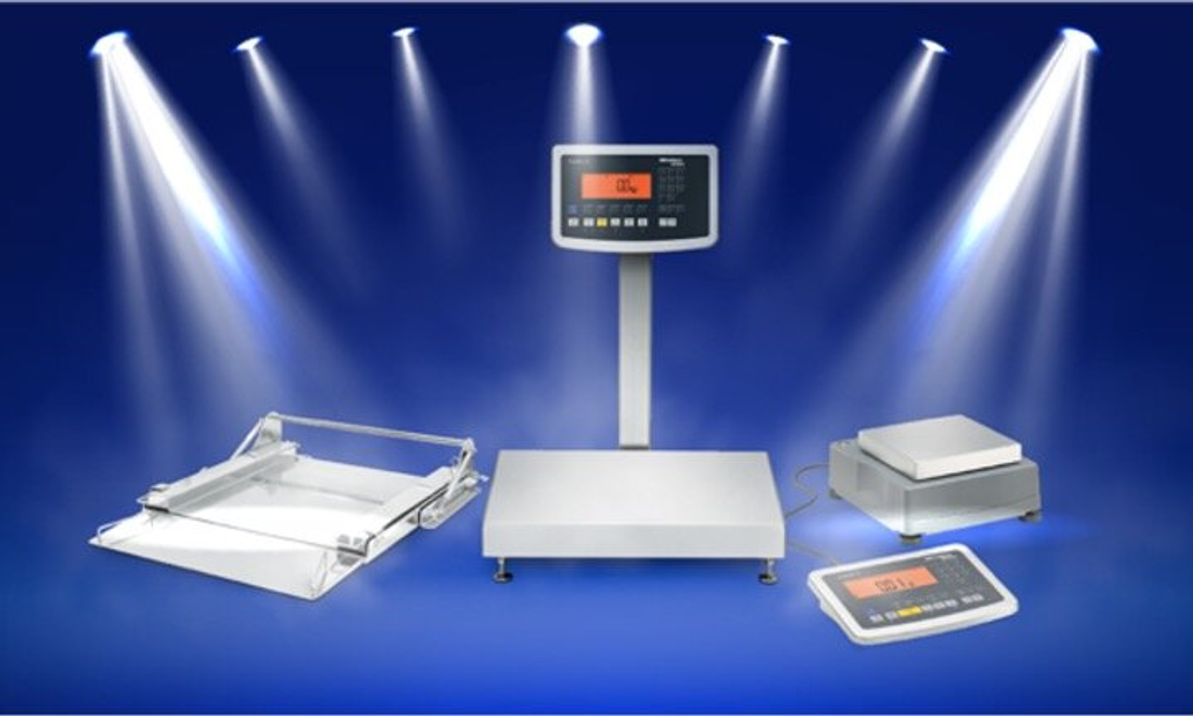Industrial Floor Scales—What, Where & How to Choose Them
The Ultimate Guide to Choosing the Right Industrial Floor Scale for Your Business
Floor scales are a type of weighing equipment that is operated on the floor level and are commonly used in various industries for accurate weighing of oversized or awkwardly shaped goods. These scales come in different sizes, capacities, and graduations, making it essential to choose the right one based on the maximum weight expected to be placed on the scale. They offer easy, efficient, and accurate measurements, enhanced productivity, reduced chances of overloading, and reduced shipment errors. In this blog post, we will discuss the benefits of industrial floor scales, the industries that can benefit from them, and how to choose the right floor scale for your business.
Benefits of Industrial Floor Scales
Industrial floor scales offer several benefits that make them an essential tool in many industries.
Easy, Efficient & Accurate Measurements
Floor scales make measuring loads easy and efficient. Items can be placed on the flat base of the scale for weighing, and the separate weight display ensures easy reading of the measurements. These scales are known for providing accurate measurements, eliminating the need for re-weighing the same loads and saving time in the weighing process.
Enhanced Productivity
Investing in industrial floor scales can enhance the productivity of your business. These scales enable quick and accurate measurements of loads, allowing for efficient operations. With faster weighing processes, businesses can save time and resources, leading to improved productivity in various industries such as manufacturing, warehousing, and logistics.
Reduced Chances of Overloading
Overloading of trucks can result in various drawbacks such as increased stopping distance, decreased brake performance, and enhanced chances of mechanical failure, which can lead to accidents or bridge collapses. Industrial floor scales can help businesses avoid overloading by accurately weighing loads before they are loaded onto vehicles, ensuring compliance with weight limits and reducing the chances of accidents or structural failures.
Reduced Shipment Errors
Errors in shipment can lead to costly mistakes for businesses. By weighing loads before they leave a location and when they reach the destination using floor scales, businesses can ensure that nothing is lost or misplaced during transit. This helps in avoiding shipment errors and ensuring accurate delivery of goods, leading to customer satisfaction and better business outcomes.
Industries that Benefit from Floor Scales
Industrial floor scales find extensive use in a wide range of industries due to their versatility and functionality. Here are some industries that can benefit from the use of floor scales:
Food Industry
In the food industry, accurate measurement of ingredients is crucial for recipe formulations. Floor scales are commonly used to weigh powders, liquids, and solids in containers, making it easier to determine the exact amount of material in each container. The high weighing capacities of floor scales make them suitable for use in commercial kitchens, bakeries, and other food processing facilities where large quantities of ingredients need to be weighed accurately.
Retail & Commercial
Floor scales are widely used in the retail and commercial industry due to their high weighing capacities and advanced functions such as check weighing and parts counting. These scales are used to maintain accurate records of stock in warehouses and distribution centers, ensuring that products are properly packed and distributed without any discrepancies. In retail stores, floor scales are used for pricing bulk items, such as fruits and vegetables, based on their weight, providing accurate and consistent pricing for customers.
Hospitals & Healthcare Facilities
Floor scales are essential tools in hospitals and healthcare facilities for measuring and monitoring the weight of patients and animals. These scales are used in clinics, hospitals, veterinary clinics, and animal research facilities to accurately measure the weight of patients or research subjects for various purposes, including medication dosages, nutritional assessments, and monitoring of health conditions. Industrial floor scales with high weight capacities and durable construction are ideal for use in healthcare settings where accuracy and reliability are paramount.
Logistics & Warehousing
In logistics and warehousing, accurate weighing of goods is crucial for efficient inventory management, shipping, and receiving processes. Industrial floor scales are commonly used in warehouses and distribution centers to weigh pallets, containers, and other large items. These scales help in determining accurate shipping weights, optimizing storage space, and preventing overloading of vehicles during shipping. Floor scales with advanced features such as digital displays, data logging, and connectivity options can further streamline logistics operations, ensuring accurate and efficient weighing processes.
Manufacturing & Production
In manufacturing and production environments, floor scales are used for various applications, such as measuring raw materials, finished products, and packaging materials. These scales are essential for maintaining quality control, ensuring accurate dosing of materials in production processes, and verifying the weight of finished goods before packaging and shipping. Floor scales with high weight capacities, durability, and advanced features such as tare functionality, data logging, and connectivity options are ideal for use in manufacturing and production settings.
How to Choose the Right Industrial Floor Scale
Choosing the right industrial floor scale for your business involves considering several factors. Here are some key considerations to keep in mind:
Weight Capacity
The weight capacity of the floor scale is one of the most critical factors to consider. It should be able to handle the maximum weight of the items to be weighed with some additional buffer to ensure accurate and reliable measurements. It's essential to choose a floor scale with a weight capacity that exceeds the heaviest item you plan to weigh to avoid overloading the scale and compromising accuracy.
Size and Platform Material
The size of the floor scale should be suitable for the items you plan to weigh. Consider the dimensions of the items and the available space in your facility to determine the appropriate size of the scale. The platform material should also be considered, as it should be durable enough to withstand the weight and usage in your specific industry. Common platform materials include steel, stainless steel, and aluminum, each with its own advantages and disadvantages.
Accuracy and Graduation
The accuracy and graduation of the floor scale are crucial for obtaining precise measurements. The accuracy of a floor scale is typically expressed as a percentage of the scale's full capacity, and the graduation refers to the smallest increment in weight that the scale can measure. Higher accuracy and smaller graduations are generally preferred for applications that require precise weighing, such as in laboratories or pharmaceutical industries.
Features and Functionality
Consider the features and functionality of the floor scale to ensure it meets your specific requirements. Some common features to look for include digital displays for easy reading of measurements, tare functionality for subtracting the weight of containers or packaging materials, data logging for record-keeping purposes, and connectivity options for integration with other systems or devices. Choose a floor scale with features that align with your specific needs and workflow.
Durability and Construction
The durability and construction of the floor scale are important factors to consider, especially in industrial environments where the scale may be subjected to heavy use and harsh conditions. Look for a floor scale with a robust construction, such as steel or stainless steel, that can withstand the rigors of your industry. Additionally, consider features such as overload protection, corrosion resistance, and water resistance to ensure the longevity and reliability of the scale.
Budget
Lastly, consider your budget when choosing an industrial floor scale. Floor scales come in a range of prices, and it's essential to find a balance between your budget and the features and functionality you need. Avoid compromising on quality and accuracy for cost savings, as investing in a reliable and accurate floor scale will provide long-term benefits
Conclusion:
Industrial floor scales are indispensable tools for various industries, including agriculture, manufacturing, logistics, healthcare, and more. They play a critical role in accurately weighing large items, optimizing processes, maintaining quality control, and ensuring compliance with regulations. When choosing an industrial floor scale for your business, it's essential to consider factors such as weight capacity, size, accuracy, features, durability, and budget.
Investing in a high-quality industrial floor scale that meets your specific requirements can provide long-term benefits in terms of accurate measurements, streamlined operations, and improved productivity. Consider the unique needs of your industry and the specific applications where the floor scale will be used to make an informed decision. By choosing the right industrial floor scale, you can enhance efficiency, accuracy, and reliability in your weighing processes, contributing to the success of your business.
Recent Posts
-
iFork Wireless Forklift: Revolutionizing Warehouse Operations for Enhanced Productivity and Efficiency
Advantages of the iFork Wireless Forklift in WarehousingWarehouses play a pivotal role in the seamle …Jul 25th 2023 -
Why Ravas iForks Truck Scales are a Game Changer for Material Handling
In the world of material handling, efficiency and accuracy are key factors that can significantly im …Jun 28th 2023 -
Introducing the Durable RAVAS Pallet Jack Scale Series
When it comes to industrial applications, the need for rugged, reliable, and efficient tools is para …Jun 9th 2023



